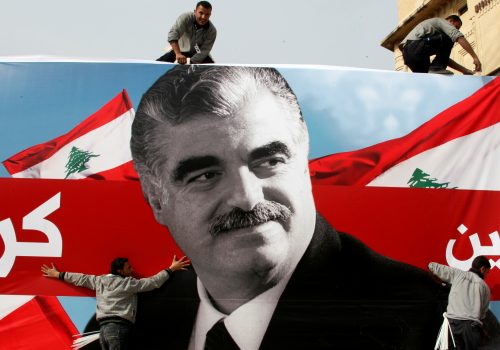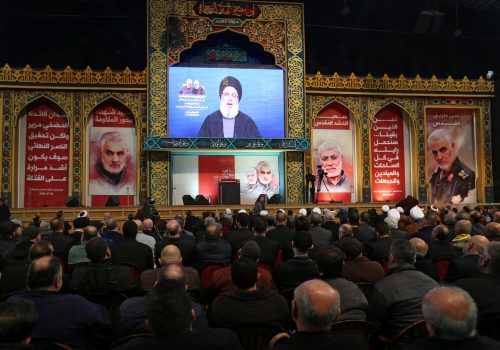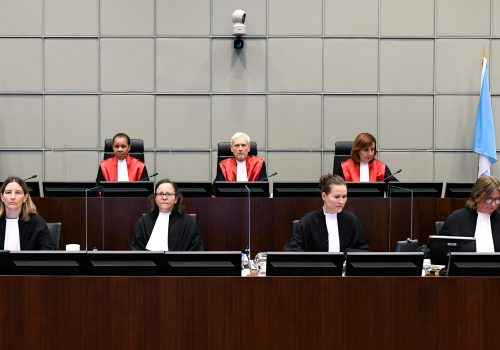The Special Tribunal for Lebanon: What does its closure mean for Lebanon?
The Special Tribunal for Lebanon (STL) is set to cease operations at the end of July due to lack of funds as Beirut sinks deeper into economic and political crisis. The tribunal was created by United Nations (UN) Security Council Resolution 1757 (2007) and was officially established in 2009 to investigate the assassination of Prime Minister Rafik Hariri. The tribunal’s budget was $67 million last year, with Lebanon paying 49% of the bill and foreign donors and the UN members covering the rest. Unsurprisingly, however, Lebanon is unable to pay the invoice.
Following the first judgment issued in August 2020, the STL found only one individual, Hezbollah member Salim Ayyash, guilty for the bombing that killed then-Prime Minister Rafik Hariri and twenty-one others. In June of this year, the tribunal was scheduled to hear arguments in a second trial regarding the assassination of Lebanese politicians George Hawi and the attempted assassinations of Marwan Hamade and Elias Murr. Despite pleas from UN Security General Antonio Guterres for member states to voluntarily contribute to secure funds to support the judicial proceedings, money remains unavailable, making the STL’s closure most likely.
Atlantic Council experts comment on the impact of the tribunal for Lebanon and the wider region.
Was the Special Tribunal for Lebanon able to deliver any tangible, albeit minor, positive outcomes for the country?
After fifteen years of investigation and legal proceedings, the expenditure of some $1 billion, the testimonies of three hundred witnesses in court, and the amassing of 170,000 pages of evidence, only one of the four defendants, Salim Ayyash, was found guilty. And none of them were in court anyway. The other three, also Hezbollah members, were found not guilty due to insufficient evidence. And Ayyash’s guilty verdict was based almost entirely on an analysis of cell phone calls in the months leading up to the assassination of Rafik Hariri in a massive truck bomb explosion in central Beirut on February 14, 2005. The Lebanese demand for the truth about who ordered Hariri’s assassination and why will remain unanswered. After such an anticlimactic outcome, the announcement in early June that the STL cannot continue its work due to lack of funds and may have to fold seems almost fitting.
It was not always this way. There was a time in the aftermath of Hariri’s death when the United Nations-mandated international investigation and subsequent creation of the STL was one of the most dominant and divisive topics in Lebanon, leading to months of political deadlock, more assassinations, and a toppled government. Damascus was instantly blamed for Hariri’s murder, which brought the United States and France into alignment on the need to establish an international investigation and tribunal on the assumption that President Bashar al-Assad had ordered the assassination. But the investigation took a dramatic and ominous turn in May 2009 when reports emerged that Hezbollah may have been involved. It was a sobering moment, even for arch critics of Assad, like Druze leader Walid Jumblatt, an ally of Hariri. Catching him in a reflective mood in early fall 2009, Jumblatt told me that Lebanon could have “justice [for the murdered Hariri] or stability, but not both.”
Over the last several years, Lebanon has experienced its worst ever economic crisis, which threatens to plunge the country into total chaos. The proceedings of the STL were long ago surpassed by the more pressing realities of life in Lebanon. As it transpires, Jumblatt was wrong in his comment about Lebanon facing the choice of justice for Hariri or stability. The Lebanese have ended up with neither.
Nick Blanford is a nonresident senior fellow with the Middle East Security Initiative at the Atlantic Council’s Scowcroft Center for Strategy and Security.
Compared to other tribunals, what made the Special Tribunal for Lebanon different, and should the international community have sought “justice” in Lebanon through a different mechanism?
From the jump, the Special Tribunal for Lebanon was an atypical international criminal tribunal, given its predominant focus on a single victim and its narrow focus on terrorism crimes, whereas similarly constituted courts tend to focus on a multitude of victims of war crimes, crimes against humanity, and genocide. Given the terms of its establishment, it is perhaps unsurprising that the court’s threatened closure is unorthodox as well. By comparison, when other courts set up under Chapter VII of the UN Charter have announced closure plans—e.g. the International Criminal Tribunal for the former Yugoslavia and the International Criminal Tribunal for Rwanda—thoughtful preparations were made to preserve the courts’ legacies and to create a residual mechanism to deal with matters arising after closure, including protection of victims and witnesses, tracking remaining fugitives, and enforcement of sentences.
If there is a rushed closure—with not much in the way of results after more than a decade of operations and $700 million spent—it will give added weight to the growing narrative in the international justice field that justice solutions should be local, and proceedings in The Hague should only be an option when there is no recourse left for trials in the country or the region. Given the state of Lebanon’s courts—which are not independent, impartial, or accountable and have further deteriorated even in the period since the establishment of the STL—many observers may wonder if the significant investment of time, effort, and resources into the STL would not have been better directed at judicial reform efforts at the local and national level.
Gissou Nia is a senior fellow with Middle East Programs at the Atlantic Council. She currently leads an effort to build a strategic litigation program on the Middle East and North Africa, with an initial focus on Iran.
Would the Special Tribunal for Lebanon ever have had any practical impact on Lebanon on Hezbollah’s standing within the country?
Unconfirmed reports indicate the STL will soon begin laying off employees. Perhaps, on some theoretical level, the untimely closure of the STL risks sending the message that terrorist groups can conduct political assassinations with impunity. And, yet, it’s unclear that the STL’s continuation or conclusion of its cases could have delivered the opposite message beyond granting the relatives of the victims the catharsis of recounting their grievances and having their stories memorialized before an international tribunal.
It’s unlikely the STL could have delivered actual results—the justice and accountability demanded by the victims—making the Tribunal, effectively, a very expensive intellectual exercise. In fact, the STL has little, if anything, to show for over a decade of operations. The Tribunal’s August 2020 verdict in the Ayyash et al. case acquitted all accused except for the eponymous Salim Ayyash, whose whereabouts are unknown. The Chamber also refrained from blaming either Hezbollah or the Syrian government for ordering Ayyash to assassinate Rafik Hariri, citing a lack of evidence despite acknowledging their motive. The highest the STL could point the accusatory finger in Hezbollah’s command echelon was at Mustafa Badreddine, who was killed in Syria in 2016.
Yet, even had the Ayyash case concluded differently, Hezbollah would have felt very little impact. The same applies to the STL’s cases which will remain unfinished due to the Tribunal’s premature shuttering. The group has spent years feeding its supporters a narrative delegitimizing the STL and any verdict it may issue. Therefore, few among the group’s supporters would have defected had Hezbollah’s leadership been found guilty of ordering the string of assassinations being investigated by the STL, including Rafik Hariri’s, making any expectation that the STL could “tarnish” Hezbollah’s image moot. Most certainly, no verdict—no matter how damning of the group—would have resulted in the Lebanese officials nor state taking any action against Hezbollah or its leadership.
David Daoud is a nonresident fellow at the Atlantic Council and a research analyst on Lebanon and Hezbollah at United Against Nuclear Iran (UANI).
What does shutting down the Tribunal mean for the rest of the region and Syria, in particular, given the level of crimes taking place right next door to Lebanon?
The STL’s judgment on August 18—limited to the finding of guilt of a single individual—was a far cry from the aspirations for justice and accountability in a country that has seen neither forty years on from the end of its bloody civil war. Yet, despite this, the STL still represents the only accountability mechanism in place to investigate and bring even negligible justice for the assassinations of Prime Minister Rafik Hariri and Lebanese politicians Marwan Hamade, George Hawi, and Elias El-Murr, among others. Rather than reform and insulate the STL from the political meddling and pressure that prevented it from issuing a more honest and far-reaching verdict on the assassination of Hariri, Lebanon and the international community are sending a chilling message that even deficient justice is superfluous. This message is not only dangerous for Lebanon, which has continued to see political assassinations and, more recently, the leveling of large parts of Beirut as a result of criminal negligence, but also for neighboring Syria, where the Syrian government has repeatedly used chemical weapons against its population, bombarded cities and towns with indiscriminate bombs, and mass detained and tortured political dissidents and even humanitarian workers. The solution to Lebanon’s political and financial woes should not be the closure of accountability bodies, but rather their modification and empowerment.
Reem Salahi (JD) is a Nonresident Fellow at the Atlantic Council and a consultant specializing in Syria, human rights and rule of law.
Image: Lebaenese demonstrators take part in a mass gathering to mark the first anniversary of First Prime Minister Rafiq Hariri's assassination in central Beirut, Lebanon. Via REUTERS.


